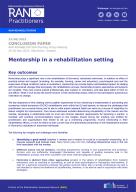Details
- Publication date
- 14 December 2023
- Author
- Directorate-General for Migration and Home Affairs
- Country
- Sweden
- RAN Publications Topic
- Community engagement/civil society
- Community policing
- Deradicalisation/disengagement and exit work
- Rehabilitation
Description
Mentorship plays a significant role in the rehabilitation of (formerly) radicalised individuals. In addition to offers of practical advice and support (including, for example, housing, career and education), psychological care and the supervision of legal conditions (when on probation), mentorship can provide highly individualised support for dealing with the personal changes that accompany the rehabilitation process. Mentorship projects, approaches and systems are versatile. They may involve trained professionals, peer support or volunteers, and take place either or both on and offline. What is true across the board however is that mentorship always relies on the participant’s autonomous motivation to change.
The key objectives of this meeting were to gather experiences of how mentoring is implemented in preventing and countering violent extremism (P/CVE) rehabilitation work within the EU and beyond, to discuss the challenges that practitioners are currently facing and to see to what extent adjacent fields can serve as a source of inspiration to deliver insights for improvement. Core issues addressed included determining compatibility of the mentor and the mentee, developing a relationship built on trust and minimal standard requirements for becoming a mentor.
A checklist with practical recommendations based on the insights shared during the meeting was drafted for practitioners and organisations that intend to set up a mentoring programme, involve mentorship in their rehabilitation efforts, or want to reflect on their current way of implementing mentorship in the rehabilitation process of (formerly) radicalised or extremist individuals.
The following key insights and challenges were identified:
- Identifying a good match between a mentee and a mentor is crucial to a successful mentorship, as it requires consent and mutual trust. Many factors play into this, including interpersonal ones or the risk level associated with the mentee.
- Different actors can be mentors, including practitioners working in exit programmes and probation, formers who are sufficiently disengaged themselves and capable of guiding someone else in the rehabilitation process, and even volunteers who have received adequate training.
- Mentorship is distinct from other approaches present in the sphere of rehabilitation from (violent) extremism, such as coaching or counselling, as well as from psychological or therapeutic interventions. It calls for a personal connection between the parties involved rather than a strictly professional one and is not intended to reduce the likelihood of (re)offending. However, it can also be used in conjunction with other strategies.
- Mentorship can provide both the mentees and the mentors with a new self-perception as well as an opportunity to develop the prosocial skills required to be part of society.

